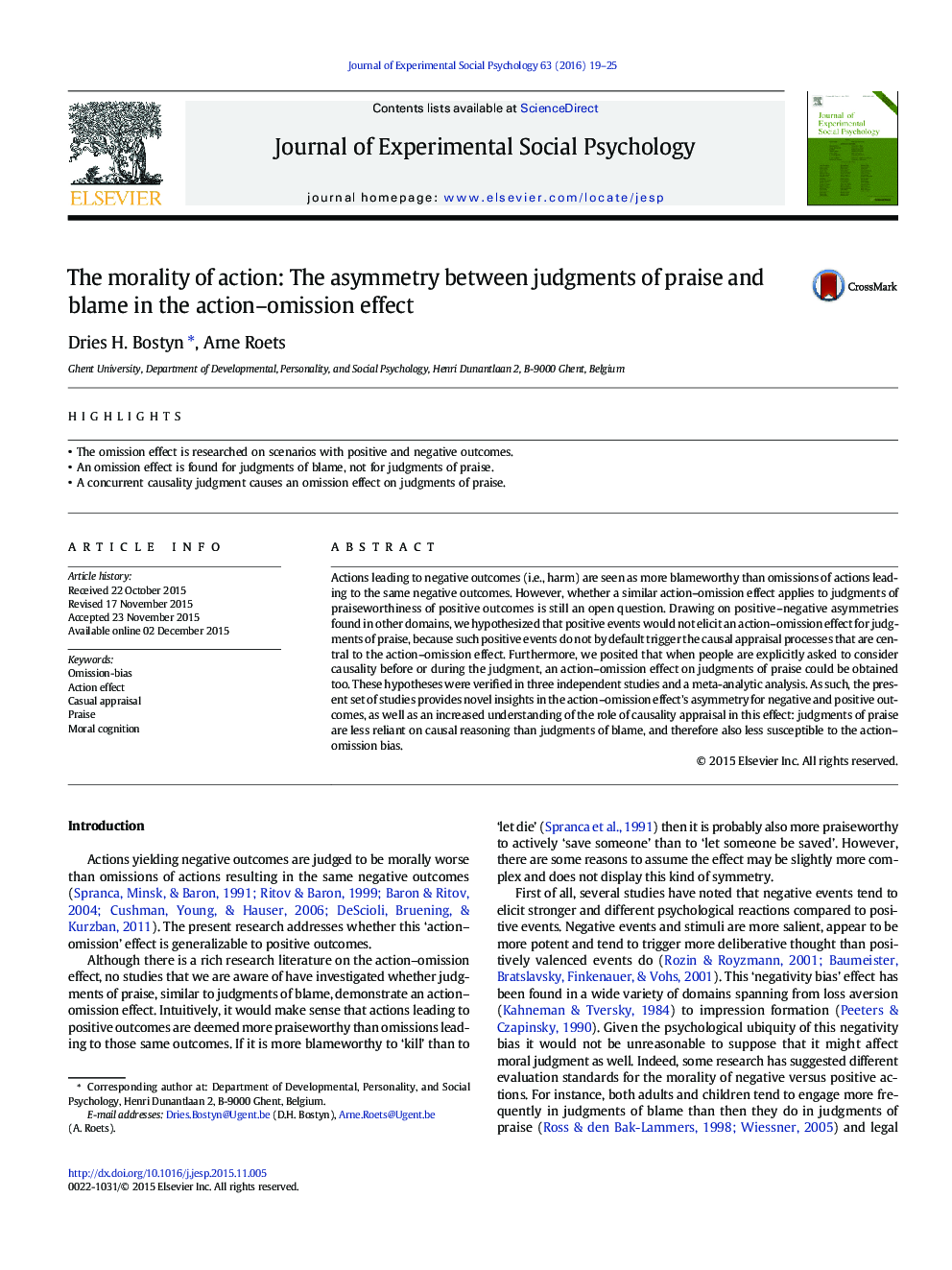| کد مقاله | کد نشریه | سال انتشار | مقاله انگلیسی | نسخه تمام متن |
|---|---|---|---|---|
| 7324428 | 1475860 | 2016 | 7 صفحه PDF | دانلود رایگان |
عنوان انگلیسی مقاله ISI
The morality of action: The asymmetry between judgments of praise and blame in the action-omission effect
ترجمه فارسی عنوان
اخلاق عمل: عدم تقارن بین قضاوت های ستایش و سرزنش در اثر عمل نادیده گرفتن
دانلود مقاله + سفارش ترجمه
دانلود مقاله ISI انگلیسی
رایگان برای ایرانیان
کلمات کلیدی
بی عدالتی، اثر عمل، ارزیابی گاه به گاه، ستایش شناخت اخلاقی،
ترجمه چکیده
اقدامات منجر به نتایج منفی (به عنوان مثال، صدمه) به عنوان تخفیف بیشتری نسبت به نادیده گرفتن اقدامات منجر به نتایج منفی دیده می شود. با این حال، آیا یک اثر غیرمستقیم اقدام مشابه در مورد قضاوت های ستایش از نتایج مثبت، همچنان یک سوال باز است. با توجه به عدم تقارن مثبت و منفی در سایر زمینه ها، ما فرض کردیم که رویدادهای مثبت نمی تواند یک اثر غیر فعال را برای قضاوت های ستایش به ارمغان بیاورد؛ چرا که چنین رویدادهای مثبت به طور پیش فرض نمی روند فرایندهای ارزیابی علی را که مهمترین عامل اجتناب است اثر علاوه بر این، ما معتقدیم هنگامی که مردم به صراحت از نظر علیت در برابر قبل و یا در طول قضاوت خواسته می شوند، می توان تأثیر اقدام غیرمستقیم بر قضاوت های ستایش را نیز به دست آورد. این فرضیه ها در سه مطالعه مستقل و یک تجزیه و تحلیل متاآنالیز تأیید شد. به همین ترتیب، مجموعه ای از مطالعات حاضر، بینش جدیدی را در عدم تقارن اثرات عمل ناکارآمدی برای نتایج منفی و مثبت و همچنین درک بالاتری از نقش ارزیابی علیت در این اثر به دست می دهد: قضاوت ستایش، کمتر به استدلال علی بستگی دارد نسبت به قضاوت های سرزنش شده، و به همین علت نیز کمتر مورد توجه قرار گرفته است.
موضوعات مرتبط
علوم زیستی و بیوفناوری
علم عصب شناسی
علوم اعصاب رفتاری
چکیده انگلیسی
Actions leading to negative outcomes (i.e., harm) are seen as more blameworthy than omissions of actions leading to the same negative outcomes. However, whether a similar action-omission effect applies to judgments of praiseworthiness of positive outcomes is still an open question. Drawing on positive-negative asymmetries found in other domains, we hypothesized that positive events would not elicit an action-omission effect for judgments of praise, because such positive events do not by default trigger the causal appraisal processes that are central to the action-omission effect. Furthermore, we posited that when people are explicitly asked to consider causality before or during the judgment, an action-omission effect on judgments of praise could be obtained too. These hypotheses were verified in three independent studies and a meta-analytic analysis. As such, the present set of studies provides novel insights in the action-omission effect's asymmetry for negative and positive outcomes, as well as an increased understanding of the role of causality appraisal in this effect: judgments of praise are less reliant on causal reasoning than judgments of blame, and therefore also less susceptible to the action-omission bias.
ناشر
Database: Elsevier - ScienceDirect (ساینس دایرکت)
Journal: Journal of Experimental Social Psychology - Volume 63, March 2016, Pages 19-25
Journal: Journal of Experimental Social Psychology - Volume 63, March 2016, Pages 19-25
نویسندگان
Dries H. Bostyn, Arne Roets,
